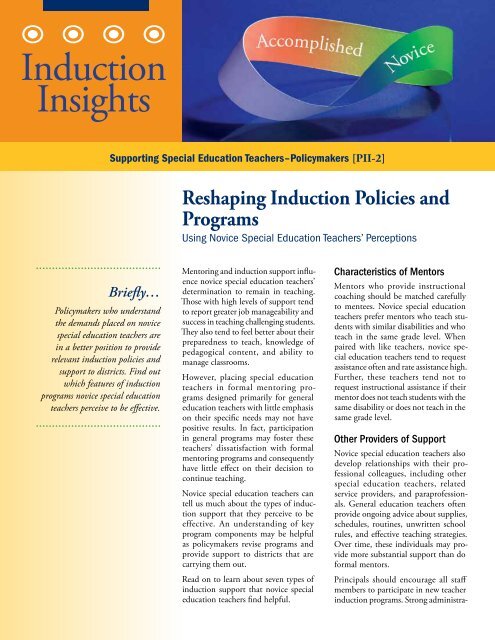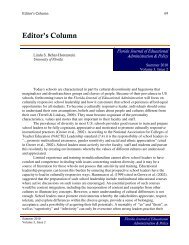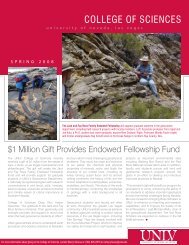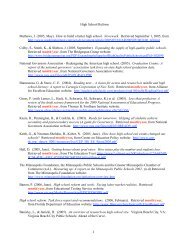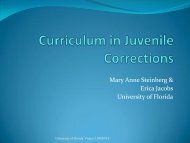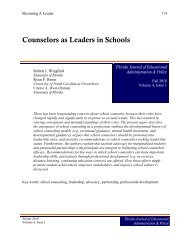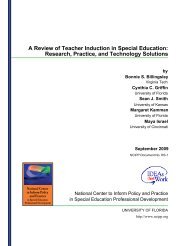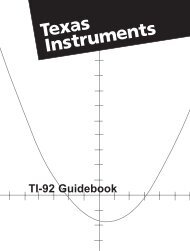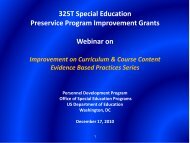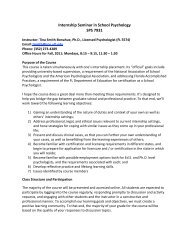Reshaping Induction Policies and Programs - NCIPP - University of ...
Reshaping Induction Policies and Programs - NCIPP - University of ...
Reshaping Induction Policies and Programs - NCIPP - University of ...
You also want an ePaper? Increase the reach of your titles
YUMPU automatically turns print PDFs into web optimized ePapers that Google loves.
Accomplished<br />
<strong>Induction</strong><br />
Insights<br />
Novice<br />
Supporting Special Education Teachers – Policymakers [PII-2]<br />
<strong>Reshaping</strong> <strong>Induction</strong> <strong>Policies</strong> <strong>and</strong><br />
<strong>Programs</strong><br />
Using Novice Special Education Teachers’ Perceptions<br />
Briefly…<br />
Policymakers who underst<strong>and</strong><br />
the dem<strong>and</strong>s placed on novice<br />
special education teachers are<br />
in a better position to provide<br />
relevant induction policies <strong>and</strong><br />
support to districts. Find out<br />
which features <strong>of</strong> induction<br />
programs novice special education<br />
teachers perceive to be effective.<br />
Mentoring <strong>and</strong> induction support influence<br />
novice special education teachers’<br />
determination to remain in teaching.<br />
Those with high levels <strong>of</strong> support tend<br />
to report greater job manageability <strong>and</strong><br />
success in teaching challenging students.<br />
They also tend to feel better about their<br />
preparedness to teach, knowledge <strong>of</strong><br />
pedagogical content, <strong>and</strong> ability to<br />
manage classrooms.<br />
However, placing special education<br />
teachers in formal mentoring programs<br />
designed primarily for general<br />
education teachers with little emphasis<br />
on their specific needs may not have<br />
positive results. In fact, participation<br />
in general programs may foster these<br />
teachers’ dissatisfaction with formal<br />
mentoring programs <strong>and</strong> consequently<br />
have little effect on their decision to<br />
continue teaching.<br />
Novice special education teachers can<br />
tell us much about the types <strong>of</strong> induction<br />
support that they perceive to be<br />
effective. An underst<strong>and</strong>ing <strong>of</strong> key<br />
program components may be helpful<br />
as policymakers revise programs <strong>and</strong><br />
provide support to districts that are<br />
carrying them out.<br />
Read on to learn about seven types <strong>of</strong><br />
induction support that novice special<br />
education teachers find helpful.<br />
Characteristics <strong>of</strong> Mentors<br />
Mentors who provide instructional<br />
coaching should be matched carefully<br />
to mentees. Novice special education<br />
teachers prefer mentors who teach students<br />
with similar disabilities <strong>and</strong> who<br />
teach in the same grade level. When<br />
paired with like teachers, novice special<br />
education teachers tend to request<br />
assistance <strong>of</strong>ten <strong>and</strong> rate assistance high.<br />
Further, these teachers tend not to<br />
request instructional assistance if their<br />
mentor does not teach students with the<br />
same disability or does not teach in the<br />
same grade level.<br />
Other Providers <strong>of</strong> Support<br />
Novice special education teachers also<br />
develop relationships with their pr<strong>of</strong>essional<br />
colleagues, including other<br />
special education teachers, related<br />
service providers, <strong>and</strong> parapr<strong>of</strong>essionals.<br />
General education teachers <strong>of</strong>ten<br />
provide ongoing advice about supplies,<br />
schedules, routines, unwritten school<br />
rules, <strong>and</strong> effective teaching strategies.<br />
Over time, these individuals may provide<br />
more substantial support than do<br />
formal mentors.<br />
Principals should encourage all staff<br />
members to participate in new teacher<br />
induction programs. Strong administra-
tor support, including regular communication,<br />
can help novice special education<br />
teachers feel well prepared.<br />
Formal <strong>and</strong> Informal<br />
Sources <strong>of</strong> Support<br />
Formally scheduled meetings with mentors<br />
appeal to novice special education<br />
teachers. Such meetings help to facilitate<br />
collaboration <strong>and</strong> communication<br />
between mentors <strong>and</strong> mentees. Novice<br />
special education teachers also perceive<br />
informal supports—such as unscheduled<br />
meetings with mentors <strong>and</strong> colleagues,<br />
unannounced classroom visits, <strong>and</strong> h<strong>and</strong>written<br />
notes—to be helpful.<br />
Sightings<br />
Consider the special education context<br />
when setting policies <strong>and</strong> providing<br />
support for induction. Novice<br />
special education teachers benefit<br />
from school-based socialization <strong>and</strong><br />
instructional coaching. However, as<br />
is typically the case in special education,<br />
there may not be one person<br />
in the novice teacher’s school who<br />
can fill both mentor roles. This<br />
situation may arise when available<br />
special education teachers in the<br />
building do not teach the same type<br />
<strong>of</strong> students as the novice <strong>and</strong>/or do<br />
not have adequate qualifications to<br />
serve in a mentor role. Learn more<br />
about solutions to this challenge—<br />
such as assigning multiple mentors<br />
<strong>and</strong> e-mentoring—in other <strong>NCIPP</strong><br />
<strong>Induction</strong> Insights Briefs.<br />
Novice special education teachers require<br />
release time for routinely scheduled<br />
meetings <strong>and</strong> other pr<strong>of</strong>essional development<br />
activities. They also benefit from<br />
pr<strong>of</strong>essional development that is focused<br />
on addressing special education issues—a<br />
particular concern <strong>of</strong> these teachers.<br />
Frequency <strong>of</strong> Support<br />
Frequency <strong>of</strong> support influences new<br />
teacher perceptions <strong>of</strong> its effectiveness<br />
or helpfulness. Novice special educator<br />
teachers who have contact with their<br />
mentor at least once a week for the first<br />
year tend to rate mentoring as effective.<br />
However, these teachers also perceive this<br />
amount <strong>of</strong> assistance to be inadequate for<br />
addressing all <strong>of</strong> their pr<strong>of</strong>essional <strong>and</strong><br />
emotional needs.<br />
Proximity <strong>of</strong> Support<br />
Novice special education teachers tend<br />
to access colleagues who are in close<br />
proximity for assistance more than<br />
their assigned mentor—especially if the<br />
mentor is not in the same building. However,<br />
they have a preference for mentors<br />
who are special educators over those who<br />
are in the same school.<br />
Content <strong>of</strong> Support<br />
Novice special education teachers find<br />
pr<strong>of</strong>essional development most effective<br />
when the content addresses their special<br />
education classroom assignments (e.g.,<br />
strategies to teach <strong>and</strong> motivate challenging<br />
students), rather than generic<br />
new teacher content. They also report<br />
needing more information than usually<br />
is provided.<br />
Although novice special education teachers<br />
typically have many instructional<br />
needs, they find the following mentoring<br />
content to be particularly helpful:<br />
••<br />
Emotional support (e.g., listening,<br />
sharing experiences, providing encouragement,<br />
<strong>and</strong> solving problems).<br />
••<br />
Materials <strong>and</strong> resources, including<br />
adapting <strong>and</strong> selecting functional<br />
materials for instruction.<br />
••<br />
Information pertaining to the school<br />
<strong>and</strong> district policies.<br />
••<br />
Information pertaining to special<br />
education paperwork <strong>and</strong> procedures<br />
(e.g., Individualized Education <strong>Programs</strong>,<br />
referrals, etc.).<br />
Evaluation<br />
Novice special education teachers feel<br />
more comfortable interacting with<br />
mentors who do not have evaluative<br />
roles. While new teachers benefit from<br />
constructive criticism <strong>and</strong> feedback from<br />
mentors, they prefer mentors to share<br />
information as guides or advisors <strong>and</strong><br />
not as supervisors.<br />
Novice special education teachers also<br />
feel uncomfortable working with mentors<br />
who have evaluative roles that<br />
require them to make decisions about<br />
the new teacher’s certification <strong>and</strong> reemployment.<br />
In these relationships,<br />
novice teachers may not want to reveal<br />
their problems <strong>and</strong> concerns to their<br />
mentors for fear <strong>of</strong> losing their jobs.<br />
Learn More. This Brief summarizes select findings from a<br />
comprehensive review <strong>of</strong> the literature:<br />
Billingsley, B. S., Griffin, C. C., Smith, S. J., Kamman, M., &<br />
Israel, M. (2009). A review <strong>of</strong> teacher induction in special<br />
education: Research, practice, <strong>and</strong> technology solutions<br />
(<strong>NCIPP</strong> Doc. No. RS-1). Gainesville, FL: <strong>University</strong> <strong>of</strong><br />
Florida, National Center to Inform Policy <strong>and</strong> Practice in<br />
Special Education Pr<strong>of</strong>essional Development (<strong>NCIPP</strong>).<br />
It is available on the <strong>NCIPP</strong> website at www.ncipp.org.<br />
National Center<br />
to Inform Policy<br />
<strong>and</strong> Practice<br />
in Special Education<br />
Pr<strong>of</strong>essional Development<br />
This Brief is part <strong>of</strong> a series designed to help special education teachers during their initial years in the pr<strong>of</strong>ession. The National Center to<br />
Inform Policy <strong>and</strong> Practice in Special Education Pr<strong>of</strong>essional Development (<strong>NCIPP</strong>) is funded by the Office <strong>of</strong> Special Education <strong>Programs</strong><br />
(OSEP) <strong>of</strong> the U.S. Department <strong>of</strong> Education (cooperative agreement # H325Q070002). Bonnie Jones is the OSEP Project Officer. Opinions<br />
expressed herein do not necessarily reflect the views <strong>of</strong> the U.S Department <strong>of</strong> Education. <strong>NCIPP</strong> aims to inform special education policy <strong>and</strong><br />
practice by examining <strong>and</strong> recommending those policies <strong>and</strong> practices that improve the retention <strong>and</strong> quality <strong>of</strong> beginning special education<br />
teachers. There are no copyright restrictions on this document; however, please use proper citation. The Briefs were produced by Warger, Eavy<br />
<strong>and</strong> Associates.<br />
© 2010 <strong>NCIPP</strong>. <strong>University</strong> <strong>of</strong> Florida, 360 Norman Hall, P.O. Box 117050, Gainesville, FL 32611 • (352) 273-4259 • ncipp@coe.ufl.edu


